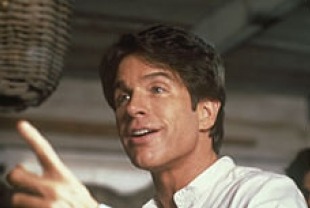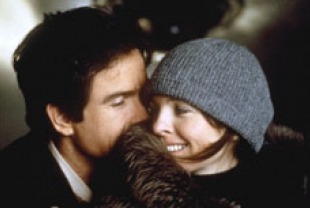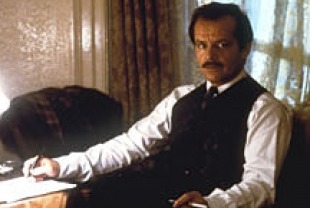Reds is a richly textured, robust, entertaining film which successfully blends history, romance, and reminiscences in its recounting of the last five years in the life of John Reed (1887-1920), a journalist, poet, and romantic revolutionary. Warren Beatty produced, directed, co-wrote (along with Trevor Griffiths), and stars in this ambitious work which aims to illuminate radical politics, the American Dream, the bohemian lifestyle, the tragedy of naïve idealism, and the problems inherent in reconciling work and love. Few movies have attempted so much.
Reds opens in 1915 when John Reed (Warren Beatty) is 28 years old. A Harvard graduate, he has already established himself as a gifted correspondent in Mexico and Europe and has spent much of his time writing for The Masses, a radical magazine. While visiting his hometown of Portland, Oregon, Reed meets Louise Bryant (Diane Keaton). They spend an entire night talking politics and art. He asks her to return with him to Greenwich Village. Later, she does join him, leaving behind her dentist husband.
Louise wants to be a writer and is convinced that she is an unusual woman. But her self-esteem is no match for the passionate idealism and artistic accomplishments of Reed's friends in the Village: Emma Goldman (Maureen Stapleton), Max Eastman (Edward Herrmann), and Eugene O'Neill (Jack Nicholson). Jack and Louise decide to live together without marrying and without jealousy, but she feels increasingly distanced from him on account of his constant travels to cover events or to protest against United States involvement in World War I.
Reed and Bryant move to Provincetown where she dabbles in art and the theatre. In all social contexts, however, she plays second fiddle to her enthusiastic and always "up" partner. A brief love affair with the cynical and adoring O'Neill only pushes Reed into marrying her. They move to Croton-on-Hudson in New York to start over. But Louise decides she must establish her own identity. She heads off to France as a journalist on the Western Front. He follows and persuades her to accompany him to Russia where the big story of the times is unfolding — the Russian Revolution.
Their love really clicks when they begin working together. In Petrograd they are totally immersed in the excitement and the spirit of the workers' movement. Returning to the States, Reed publishes his book Ten Days That Shook the World and becomes involved in remaking America's Socialist Party according to the model he saw in Russia. Blocked in this effort by the party's right wing, Reed and those who side with him form the Communist Labor Party of America.
Louise, meanwhile, is alarmed by her husband's new understanding of himself as a political leader. When he returns to Russian to seek recognition for the Communist Labor Party, she stays behind. Their life as writer-colleagues has come to an end.
The Russian Communists, led by a hard-line Bolshevik named Zinoviev (Jerzy Kosinski), refuse Reed's request for approval of the party and then demand that he stay to work in the propaganda office. The somewhat disenchanted American tries to escape Russia across the Finnish border, but he is captured and imprisoned until the Russians secure his release.
Louise, after re-evaluating her love for Jack once again, travels to Europe in an attempt to locate him. In Russia, she meets Emma Goldman who now believes "the dream we had. . . . is dying." Zinoviev has taken Reed to a party conference in Southern Russia. When he returns, now very ill from his very long travail, Jack and Louise are reunited just before he dies at the age of 33 in a Moscow hospital.
Dreamers are often larger-than-life characters; they inspire others with their abundance of hope and belief. But they can be difficult to live with on a day-to-day basis. Warren Beatty has skillfully interwoven into the film on-camera interviews with an interesting group of 32 "witnesses" — individuals such as Henry Miller, Will Durant, Adela Rogers St. John, and Arthur Mayer — who were associates or friends of Jack Reed and Louise Bryant. Their historical and personal footnotes add depth and perspective to the film.
Reds also has a contemporary tang to it. It is a fascinating consideration of the demands of love and work. Reed and Bryant are protean individuals whose lives are an interminable series of experiments and explorations, each of which is readily abandoned for another quest or horizon. Louise tries writing, then turns to drama, and finally realizes that her love for Jack transcends her identity through work.
Reed, on the other hand, is incapable of settling down — even after experiencing the best moments of his life while working in tandem with Louise during the revolution in Russia. Warren Beatty's triumph in Reds is to bring these two characters and their personal conflicts to life on the screen in a way that makes them seem to be our contemporaries.
Special DVD features include: "Witness to Reds: The Rising"; "Witness to Reds: Comrades"; "Witness to Reds: Testimonials"; "Witness to Reds: The March"; "Witness to Reds: Revolution Parts 1 and 2"; and "Witness to Reds: Propaganda."


